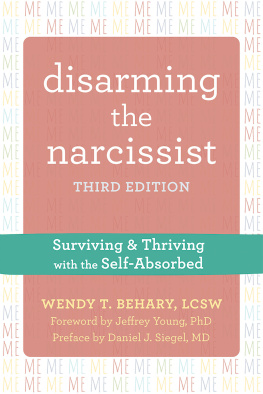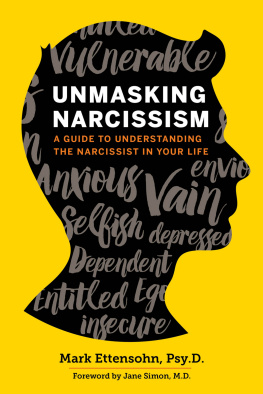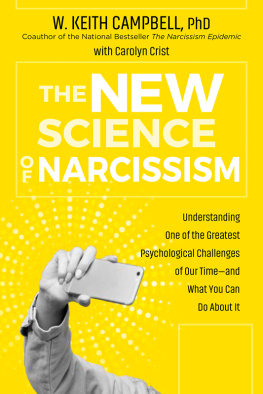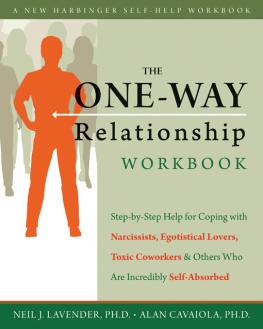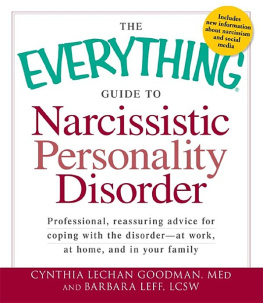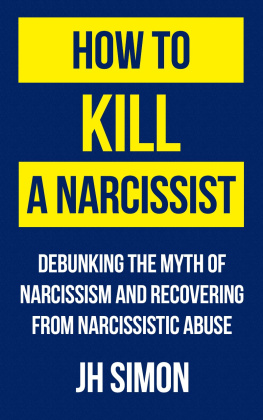
When you
LOVE a MAN
Who Loves
HIMSELF...
When you
LOVE a MAN
Who Loves
HIMSELF...

w. keith campbell, Ph D
Copyright 2005 by W. Keith Campbell
Cover and internal design 2005 by Sourcebooks, Inc.
Cover photo Getty Images
Sourcebooks and the colophon are registered trademarks of Sourcebooks, Inc.
All rights reserved. No part of this book may be reproduced in any form or by any electronic or mechanical means including information storage and retrieval systemsexcept in the case of brief quotations embodied in critical articles or reviewswithout permission in writing from its publisher, Sourcebooks, Inc.
This publication is designed to provide accurate and authoritative information in regard to the subject matter covered. It is sold with the understanding that the publisher is not engaged in rendering legal, accounting, or other professional service. If legal advice or other expert assistance is required, the services of a competent professional person should be sought.From a Declarationof Principles Jointly Adopted by a Committee of the American Bar Associationand a Committee of Publishers and Associations
This book is not intended as a substitute for medical or psychological advice from a qualified physician. The intent of this book is to provide accurate general information in regard to the subject matter covered. If medical advice or other expert help is needed, the services of an appropriate medical professional should be sought.
Published by Sourcebooks, Inc.
P.O. Box 4410, Naperville, Illinois 60567-4410 (630) 961-3900 FAX: (630) 961-2168 www.sourcebooks.com
Campbell,W. Keith.
When you love a man who loves himself / W. Keith Campbell.
p. cm.
Includes bibliographical references.
ISBN 978-1-4022-3543-6
1. Narcissism. 2. Man-woman relationships. I. Title.
BF575.N35C36 2005
646.7'7--dc22
Printed and bound in Canada
TR 10 9 8 7 6 5 4 3 2 1
For Stacy and McKinley Grace
Acknowledgments
The ideas presented in the book are the result of research collaboration with many terrific colleagues. Although there are too many to list all of them, my thanks to: Dr. Roy Baumeister, Angelica Bonacci, Dr. Brad Bushman, Amy Brunell, Dr. Andy Elliot, Dr. Julie Exline, Dr. Eli Finkel, Dr. Craig Foster, Josh Foster, Dr. Adam Goodie, Dr. Madoka Kumashiro, Dr. Glenn Reeder, Dr. Eric Rudich, Dr. Caryl Rusbult, Dr. Constantine Sedikides, Dr. Jeremy Shelton, Ilan Shrira, Dr. Jean Twenge, and Dr. Kathleen Vohs. I am also grateful to Marrianne Bellino, Amy Brunell, Kathleen DiPaolo, Drs. Jeff and Jodie Green, Bill McMahan, Lisa Reichenbach, Pam Riddle, Deb Werksman, and, in particular, Linda Konner, for reading drafts of this manuscript and supplying detailed feedback and suggestions. Finally, I would like to thank all the research participants who were in our studies and all the individuals who were willing to share their stories.
Table of Contents
Introduction
Before I begin to lecture in my romantic relationships class, I usually ask if anybody has anything interesting to talk about. A few weeks ago, a student raised her hand and said that she had been at the spring fraternity formal with her boyfriend. At the formal, they announced several awards, one of which was the award for the most hook-ups during spring break. Her boyfriend, it turned out, was the winner.
At this, the whole class quieted down. I asked what her boyfriend did after the announcement. She went on to say that he went to the podium to make a brief acceptance speech, which went something like, What can I say? A lot of alcohol and a lot of girls. (Truly a modest person!) He then walked off the podium and stood next to her again.
She, of course, was somewhat shocked and upset. They had been dating for over a year and she knew nothing about this. He turned to her and asked why she was upset. (Not only a modest person, but caring too!) She replied that it might have something to do with his infidelity.
At this point, I had a pretty good idea that we were dealing with a relationship with a narcissist, so I asked, He said it was your fault, right?
She laughed a bit and said that he had gotten angry and blamed her for ruining his formal. He also said that the infidelities didnt mean anything, and that he hadnt told her because he didnt want her to get upset (more deep concern on his part, of course!).
Someone in the class asked what she did, and she said that she ended things with him right there. The students in class were impressed at how tough she was. I asked her a few more questions about her relationship. As I had expected, the now ex-boyfriend turned out to have been charming, attractive, outgoing, and extroverted. He was also a bit cocky. And, of course, he had been lying to her about his commitment for a long time. In short, he sounded like a typical narcissist. I explained to her that her story was unfortunately pretty familiar, and that I would spend a full week lecturing on narcissism later in the semester. I went back to setting up the days lecture, and several of the students commiserated with her and quickly told her that they had had similar experiences.
I have been studying narcissistic men for the last decade. These are men that have very positive opinions about themselves. For example, a man thinks that he is highly attractive and intelligent. At the same time, he also has relatively negative opinions of most others. In fact, instead of looking for emotionally close relationships, he uses other people to maintain his own self-love. He derogates the success of others. He competes with and dominates others. In the instances where he cant beat em, he joins them. For example, this man will associate with popular or successful people in order to keep up his own self-love. In psychological literature, we call these individuals narcissists because they are seen as similar to the mythical Greek figure Narcissus, who fell in love with his own reflection.
My reasons for studying narcissists have been purely academic. I have been fascinated by the way that individuals with inflated and unrealistic self-views navigate their way through social life. How can someone who is basically average go through life thinking that he is a ten? How does someone who is no more successful than many other people actually think he is king of the universe? How does someone change his social world to fit his inflated self-image? Somewhat on a whim, I began studying how narcissists experience romantic relationships. This research resulted in a doctoral dissertation on narcissism and romantic attraction. This topic has continually proven to be very exciting because, frankly, seemingly normal and well-adjusted people do all sorts of strange things in their romantic relationships.
While I was engaged in my academic research on the subject of narcissism, I noticed a strange occurrence. Every time I talked about narcissists romantic relationships in the classroomor even with friendswomen would seem to pay particular attention to what I was saying. The women would at first get a puzzled look in their eyes, then start nodding, and finally have an a-ha experience. Then the responses would come: You know, I dated a guy like that oncewhat a jerk. My roommate is dating a guy like that, he keeps cheating on her and she keeps letting him. Why did I go out with a guy like that? Can you change someone like that? Often the individual had never really put the pieces together. She knew that there was something wrong with the relationship, but learning about narcissism allowed her to see the full picture.
Next page



